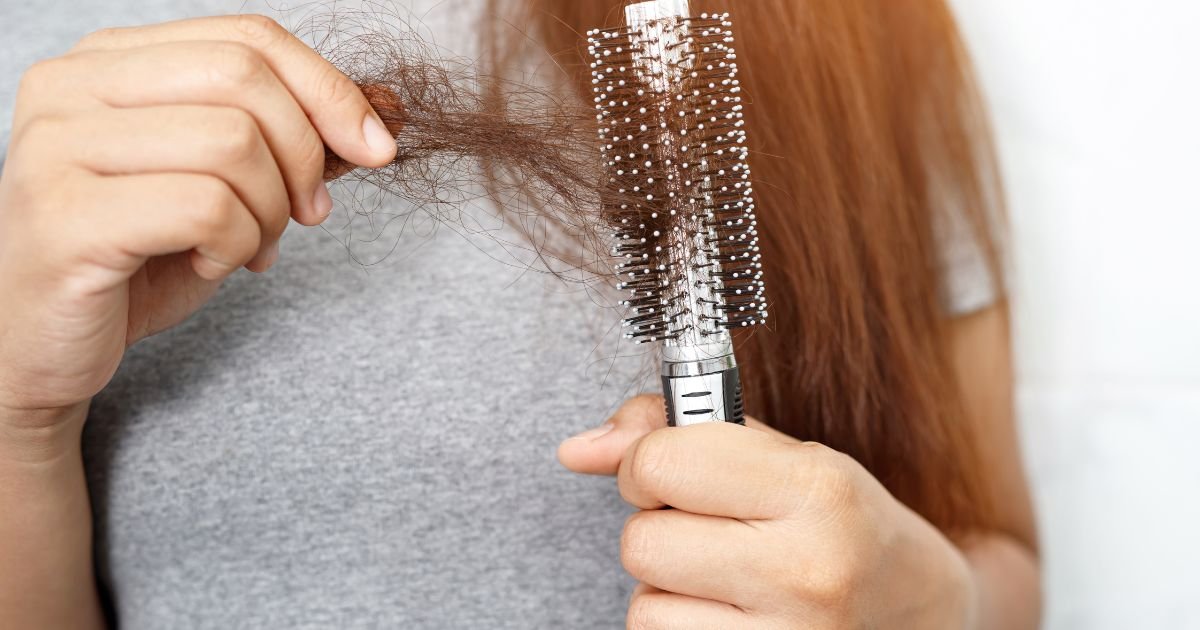Breakage vs. Hair Loss: What’s The Difference?
What is Hair Loss?
Hair loss is like that friend who ghosted you and you wonder whether they’ll ever come back into your life.
Unlike breakage, which is when your hair snaps or breaks off along the length, hair loss is when your hair suddenly leaves you, falling out from the root. This can happen for a variety of reasons, which we'll get into in just a moment.
But first, let's chat about the difference between hair loss and breakage.
What is breakage?
Breakage is damage along the shaft of your hair that causes it to split or break off. With breakage, the hair is not being lost from the follicle, instead it is snapping or breaking along the length.
Hair loss vs. breakage: what's the difference?
Hair loss and breakage might seem like they're the same thing, but they're really more like distant cousins.
While breakage is about your hair getting damaged and snapping off along the shaft, hair loss is when your hair falls out from the root, usually due to an issue with your hair follicle or underlying health conditions. Now, let's get into the nitty-gritty of what causes hair loss and how to deal with it.
There are loads of reasons you could be experiencing hair loss, so let's break it down and look at some of the most common culprits.
Reason #1: It's in your genes
Sometimes, hair loss is just in your DNA, like inheriting your grandma's love for cats or your dad's obsession with vintage records. If your family has a history of hair loss, you might be more likely to experience it too. It's called hereditary hair loss, and while it can't be completely stopped, there are many preventatives out there now, you just have to know the right one for you!
Reason #2: Hormone havoc
Ever noticed that your hair seems to fall out more during certain times in your life? Your hormones can play a big role in hair loss. Things like pregnancy, hormonal birth control, menopause, or thyroid issues can mess with your hormones and lead to hair loss. In many cases, once your hormones balance out, your hair will start to grow back.
Reason #3: Stress
We've all been there: stressed out to the max and feeling like we're losing our minds. Well, guess what? Too much stress can also cause you to lose your hair! Luckily, this type of hair loss is usually temporary. Once you get your stress levels in check, your hair should start growing back.
Reason #4: Hair care gone wrong
Wearing extremely tight hair styles can cause hair loss over time, which is called traction alopecia. This happens when there’s too much tension on your hair over a long period of time. The good news is that, with some hairstyle adjustments, this type of hair loss is often reversible.
Reason #5: Not-so-healthy habits
Your lifestyle and diet can also play a role in hair loss. A poor diet, lack of exercise, and not getting enough sleep can all contribute to hair loss. The fix? Try to be mindful of your lifestyle and treat your body right, and your hair might just thank you for it.
How to deal with hair loss
Now that we know what's causing your hair loss, let's talk about how to address it. The first step is to see a trichology specialist to figure out the root cause (pun intended) of your hair loss.
What about breakage?
Here are some of the main causes of breakage, and some tips that will prevent your hair from snapping:
Reason #1: Wearing certain hairstyles
Wearing certain hairstyles can also be the cause of breakage. Styles such as tight braids or scraped back ponytails can be a common culprit when it comes to breakage.
Prolonged tension on the hair from your scalp can lead to a condition known as traction alopecia, which means that hair styles can cause both breakage and hair loss.
Consider wearing looser hair styles with less tension - your scalp will thank you! Did you know that tight braids and ponytails can also cause headaches?
Reason #2: Hair bands, clips and accessories
Unfortunately, our favourite hair accessories can also be responsible for causing breakage. Elasticated hair bands (aka “bobbles”) are a common culprit, especially those with a metal clasp on them. It’s so easy for hair to get caught up in the band.
If you need to tie your hair back, consider switching to a silk hair tie or satin scrunchie instead. These are much kinder to your hair as they cause less friction than regular hair ties.
Reason #3: Heat styling tools
We all know that heat is damaging for our hair. Overusing heat styling tools, such as straighteners, curling wands or even having your hairdryer set too high can damage your hair.
Try turning your heat styling tools down to lower than 180 degrees to reduce heat-induced breakage. You can also ensure that you apply a heat protector to your hair. Be mindful of how much heat styling you are doing and look heat alternative techniques you can do.
Heat protector needs to be applied to each section - it needs more than a few cursory sprays!
Reason #4: Over-brushing your hair
Are your aggressive when you run a brush or comb through your hair? When you reach a knot or a tangle, do you force the comb through it or take a more gentle approach?
If you’re too rough with your hair brush, it can also cause breakage.
Try to brush your hair in a gentler and strategic way to avoid breakage. For example, instead of brushing your hair from root to tip, start brushing your hair at the bottom and work your way up.
This causes less tension for your hair (and it’s less painful too!)
Reason #5: Neglecting your hair care
You must maintain your hair if you want it to look and feel healthy! Don’t neglect any steps in your hair care routine, at the very least:
● Wash your hair in lukewarm water with a gentle shampoo
● Use rinse-out conditioner, but gently comb it through your hair before rinsing
● Also use a leave-in conditioner for hair that’s weakened
● Always use heat protector, even if you’re just blow drying your hair with low-heat
● Make sure a scalp and hair treatment is in your routine at least once a month
● Get regular trims to get rid of any split or frayed ends. These damaged ends can travel up the hair shaft over time leading to… (you’ve guessed it) breakage.
Reason #6: Chemical hair treatments and colours
Hair treatments such as:
● Bleaching/lightening/highlights
● Hair dyes (both in-salon and at-home)
● Perm treatments
● Chemical straightening solutions
…they all damage your hair. These treatments alter the chemical structure of your hair in order to change its natural texture or colour. While these treatments are perfectly safe, it’s important that they’re used responsibly by an experienced professional.
Too many chemical treatments means that your hair becomes “over processed” and is more susceptible to breakage.
Any treatment that alters the texture or colour of your hair is a commitment to maintain, so make sure you listen to your stylist’s advice about after-care and the correct products to use for your hair type.
Avoid at-home chemical treatments such as box dyes or home perm kits.
In hair salons, we customise each treatment for the client, taking many different factors into account such as your hair type, your hair’s history and your goals for your new look. At-home treatments are unpredictable one-solution-fits-all formulas that often require professional correction afterwards.
Reason #7: Sleeping also causes breakage!
When we sleep and move about during the night, this causes friction between your hair and your pillowcase. If you often wake up with tangled or knotted hair, then your pillowcase may actually be causing it!
You could try switching to a silk or satin pillowcase, which will have less friction. It’s a good idea to pair this with one of our silk hair bonnets, which are perfect to wear overnight to protect your hair from friction-induced breakage.
Hair Loss vs. Breakage: Conclusion
Hair loss and breakage are not the same - even if the causes and effects are similar. It’s important that you effectively diagnose your hair woes before jumping to conclusions.
Tiffany is a qualified trichologist offering bespoke treatments for those suffering from hair loss and scalp concerns. Tiffany has over 15 years of experience in the hairdressing industry, specialising as a hair colour specialist and is the co-founder of Amaryllis salon in South Wales.


